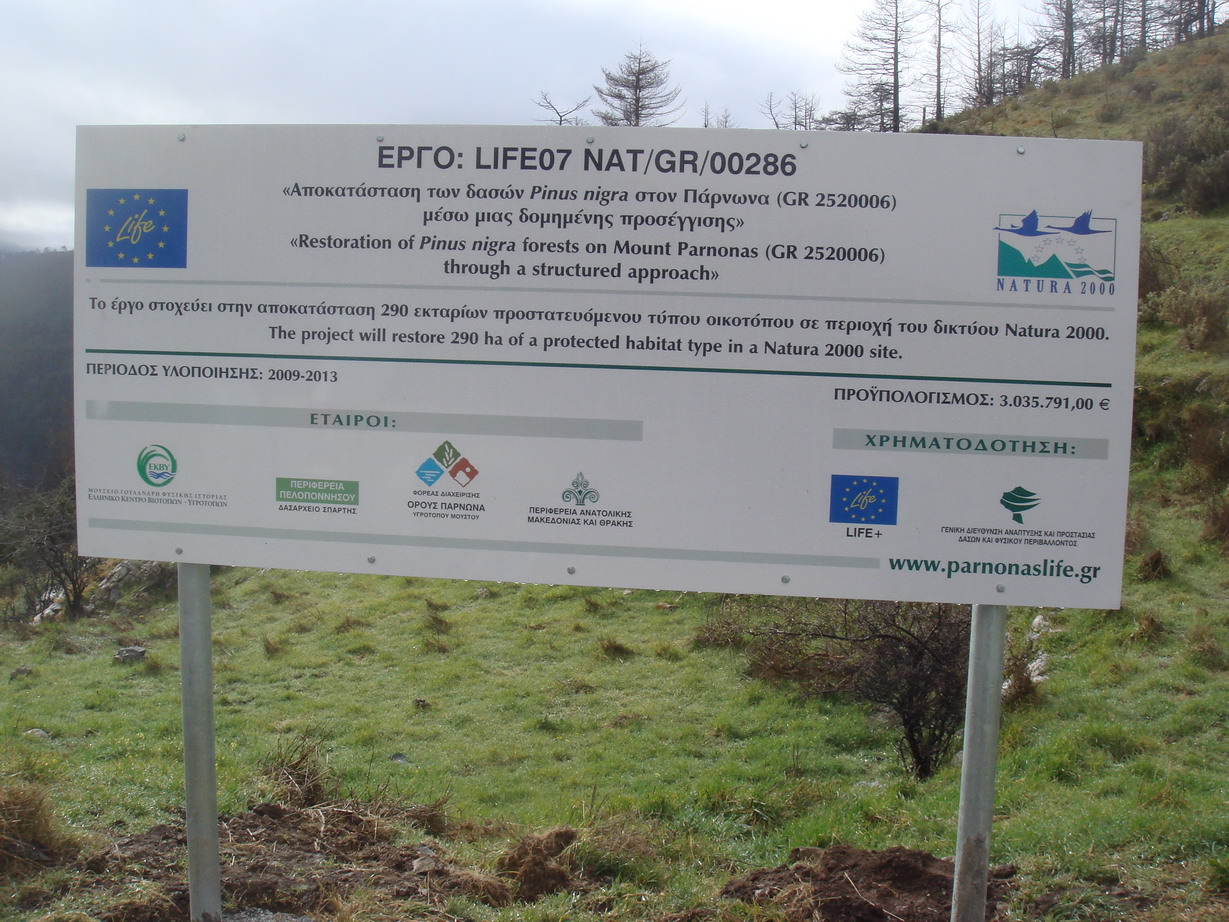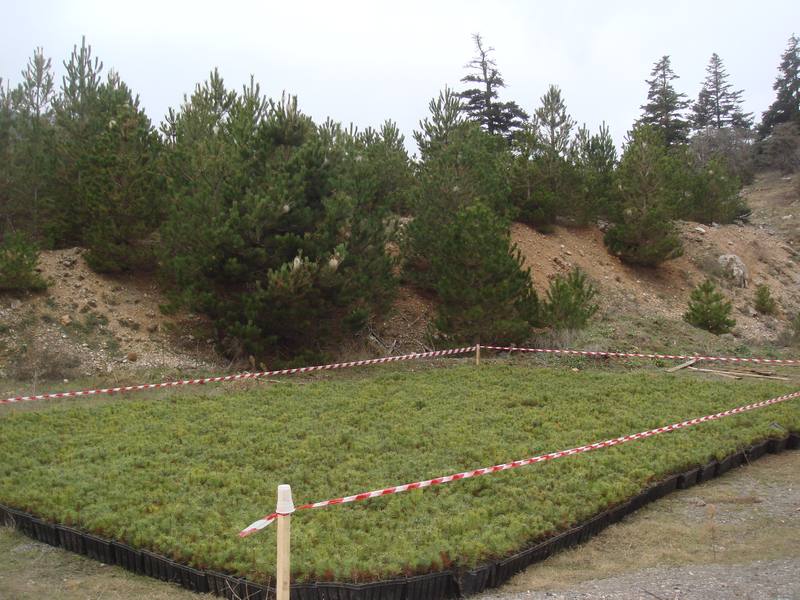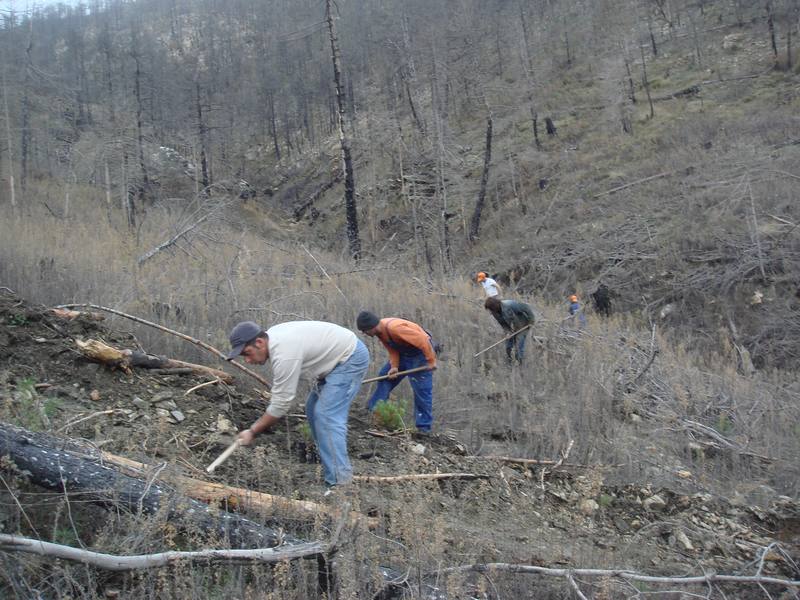News|Announcements
 The project LIFE+ NATURE LIFE07 NAT/GR/000286 entitled “Restoration of Pinus nigra forests on Mount Parnonas (GR2520006) through a structured approach” which was implemented by the Goulandris Natural History Museum/Greek Biotope - Wetland Centre in cooperation with the Decentralised Administration of the Peloponnese - Western Greece & Ionian Sea, the Decentralised Administration of Macedonia - Thrace and the Management Body of Mount Parnon and Moustos Wetland, has participated as one of the finalists in the first European Natura 2000 Award. The winners who were announced at a ceremony in Brussels on May 21st 2014 received trophies from the European Commissioner for the Environment, Janez Potočnik, along with members of the award Jury.
The project LIFE+ NATURE LIFE07 NAT/GR/000286 entitled “Restoration of Pinus nigra forests on Mount Parnonas (GR2520006) through a structured approach” which was implemented by the Goulandris Natural History Museum/Greek Biotope - Wetland Centre in cooperation with the Decentralised Administration of the Peloponnese - Western Greece & Ionian Sea, the Decentralised Administration of Macedonia - Thrace and the Management Body of Mount Parnon and Moustos Wetland, has participated as one of the finalists in the first European Natura 2000 Award. The winners who were announced at a ceremony in Brussels on May 21st 2014 received trophies from the European Commissioner for the Environment, Janez Potočnik, along with members of the award Jury.
 “My warmest congratulations to these deserving winners!” said Commissioner Potočnik. “Thanks to the tireless efforts of people working for and in Natura 2000 sites, our vast network of protected areas is developing into a real success for European cooperation. These awards showcase some examples of the great work that is being done across the EU by site managers, public authorities, conservation organisations and volunteers, farmers, foresters, hunters and fishermen, scientists, teachers and many others besides. This is their day, and they richly deserve this success."
“My warmest congratulations to these deserving winners!” said Commissioner Potočnik. “Thanks to the tireless efforts of people working for and in Natura 2000 sites, our vast network of protected areas is developing into a real success for European cooperation. These awards showcase some examples of the great work that is being done across the EU by site managers, public authorities, conservation organisations and volunteers, farmers, foresters, hunters and fishermen, scientists, teachers and many others besides. This is their day, and they richly deserve this success."
 Natura 2000 is a network of over 27 000 protected sites that covers 18 % of the EU landmass and 4 % of marine areas, protecting and enhancing Europe’s natural heritage. These Awards recognise excellence in Natura 2000 site management, showcasing the value of the network for local communities and economies. Reflecting the wide range of work carried out across the Natura 2000 network, they include five categories: Conservation, Socio-Economic Benefits, Communication, Reconciling Interests/Perceptions, and Networking & Cross-Border Cooperation.
Natura 2000 is a network of over 27 000 protected sites that covers 18 % of the EU landmass and 4 % of marine areas, protecting and enhancing Europe’s natural heritage. These Awards recognise excellence in Natura 2000 site management, showcasing the value of the network for local communities and economies. Reflecting the wide range of work carried out across the Natura 2000 network, they include five categories: Conservation, Socio-Economic Benefits, Communication, Reconciling Interests/Perceptions, and Networking & Cross-Border Cooperation.
…and the winners are …
The Conservation Award went to a project to save the imperial eagle in Sakar, Bulgaria. Thanks to the work of the project team and the cooperation between conservationists and private companies, the local population of this globally threatened species has been brought back from the brink of extinction. By working with energy companies to insulate dangerous power lines and bury overhead cables, the project successfully eliminated the risk of electrocution, a serious problem facing this bird of prey.
A project in Sighișoara-Târnava Mare, Romania won the Socio-Economic Benefits Award, with an impressive example of Natura 2000 providing economic growth and sustainable livelihoods in rural areas. The project enables farmers to make a better living by working sustainably on high nature value land, while also preserving a unique landscape with rich biodiversity. Thanks to the project, 2300 farming families in the region generate income of more than €2.5 million annually, and similar ideas are now being applied in other parts of Romania.
The Communication Award goes to Raná-Hrádek in the Czech Republic for promoting the protection of dry grassland habitats in the Louny region. A ‘Celebration of the steppes’ event attracts 1000 people every year in May, and an annual art competition helps make children more aware of conservation work. The project raises awareness amongst EU citizens about the value of natural heritage.
The Reconciling Interests/Perceptions Award went to a project in the Vijvergebied van Midden Limburg site in Belgium. Landowners, nature organisations and authorities – once in conflict over nature conservation – now work together here to manage wetlands, thanks to an innovative approach combining economy, ecology and education.
The Networking & Cross-Border Cooperation Award goes to a technical cooperation network in Spain for developing quality standards for management and a reference website on the state of the Natura 2000 network in Spain. Rebollar de Navalpotro in Guadalajara is one area where these actions have been successfully applied, showing how Natura 2000 is both a network of species and habitats and a network of people.
Background
Anyone directly involved in Natura 2000 – businesses, authorities, NGOs, volunteers, land owners, educational institutions or individuals – could apply for this Award, and a total of 163 applications from across Europe were received. From these, a shortlist of 22 applications was submitted to a high-level jury, who then selected the winner of each category.
Following the interest shown in this Award, the quality of the submissions and the importance of highlighting the fantastic conservation work being carried out across Europe, the European Commission aims to make this Award an annual event.
For more information:
Pictures of the winnings sites can be downloaded here: Natura 2000 Awards press material.
For more about the winners and the role that Natura 2000 sites play in helping to protect Europe’s biodiversity can be found on the Natura 2000 Award website: http://ec.europa.eu/environment/nature/natura2000/awards/
For more about Nature in Europe: http://ec.europa.eu/environment/nature/natura2000/index_en.htm
https://www.facebook.com/NatureInEuropehttp://europa.eu/rapid/press-release_IP-14-584_el.htm
Source: http://europa.eu/rapid/press-release_IP-14-584_en.htm

